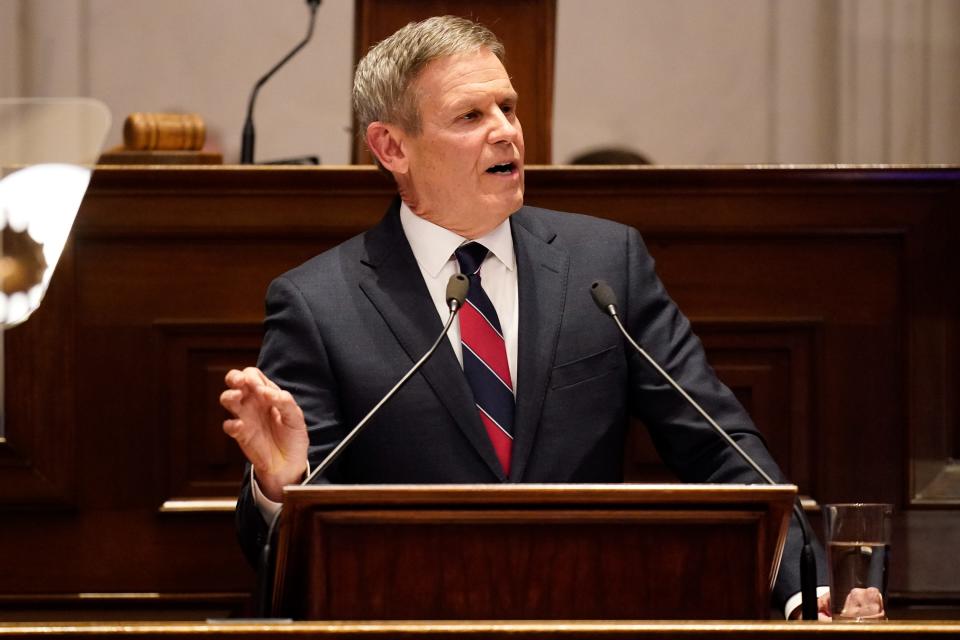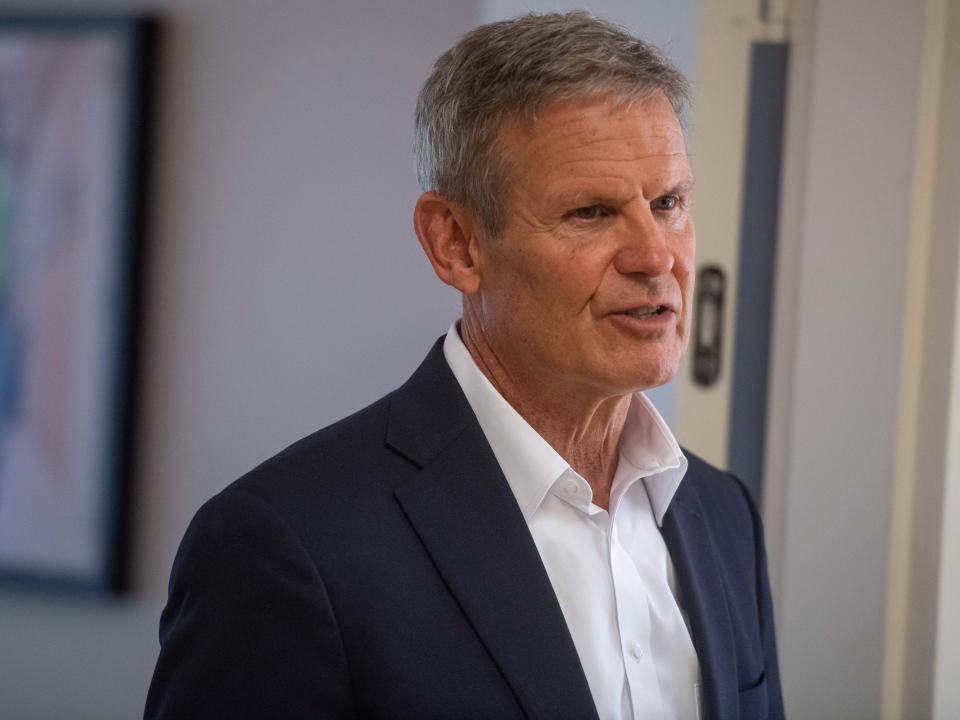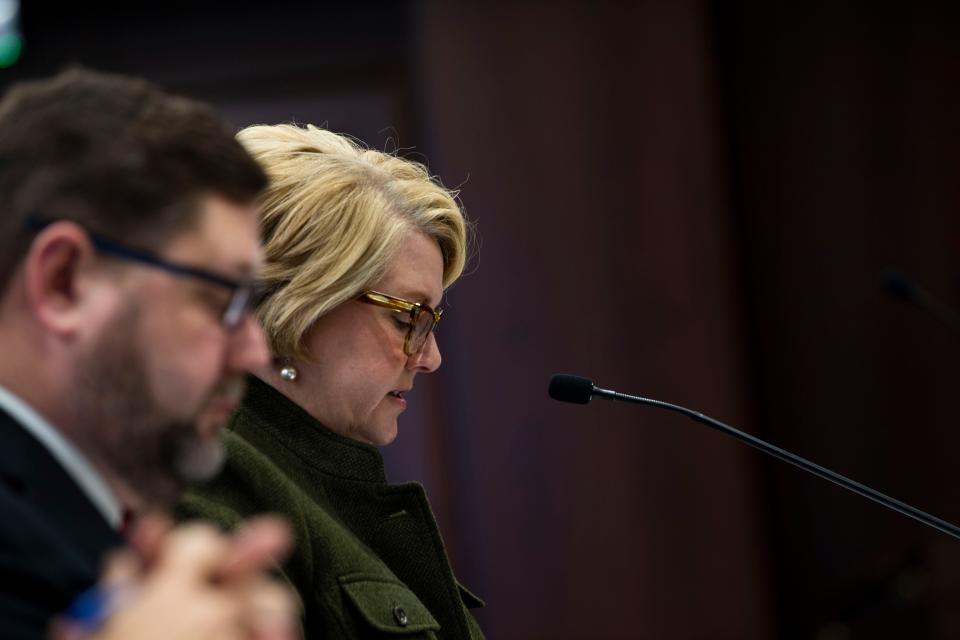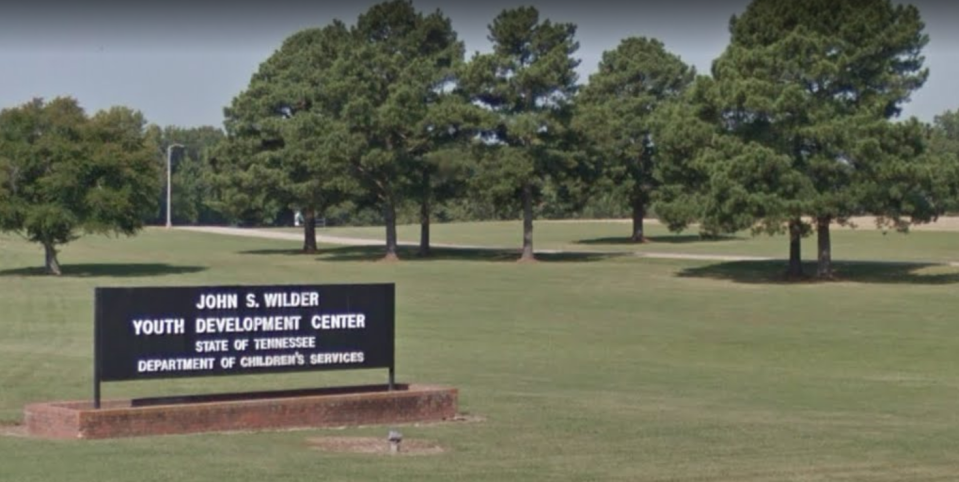The week in politics: Lee outlines $20M program for controversial crisis pregnancy centers
- Oops!Something went wrong.Please try again later.
Crisis pregnancy centers and nonprofits seeking to assist families with adoptions in Tennessee may now apply for $20 million in state-funded grants, Gov. Bill Lee announced this week.
Lee had originally proposed to allocate $100 million for the Tennessee Strong Families grant program, but lawmakers trimmed the allocation to $20 million during budget negotiations this spring. The governor is listed on its website as a co-founder and previously served on the board of directors of The Hope Clinic, a crisis pregnancy center in Nashville.
The new grant program is aimed at “improving access to maternal healthcare” and increasing resources for pregnant women by supporting pregnancy resource centers. Organizations may apply if they provide mental health and counseling services to pregnant women, support for parents considering adoption, workforce assistance for new moms, and housing assistance for mothers in crisis.
The Tennessee Department of Health does not license crisis pregnancy centers, nor are they overseen by the state Health Facilities Commission, which is tasked with licensing medical facilities. Critics of the centers argue the faith-based facilities can give medically inaccurate anti-abortion counseling to mislead women in crisis, while proponents say they serve a growing need in the community.
More: How Gov. Bill Lee's push for $100M in grants is putting pregnancy centers in the spotlight

“Being pro-life is much more than protecting the lives of the unborn – it’s also about protecting the dignity of every human being,” Lee said in a statement.
But for many Tennessee women, lack of health insurance coverage to allow a woman to attend prenatal visits and deliver her baby without facing financially debilitating medical bills is a much more significant barrier.
In 2021, about 10% of Tennesseans were uninsured, including 223,000 people – who might be eligible for Medicaid if the state expanded the program, according to analysis of census data by the Sycamore Institute.
Tennessee’s income limit for TennCare enrollment for pregnant women is $38,454 for a two-person household, and $48,477 for a three-person household.
Lee has advocated for extending TennCare coverage for postpartum mothers, expanded dental benefits to some of those previously ineligible, and is covering the cost of half of the diapers needed for the first two years of a baby’s life for TennCare families. However, the governor does not support expanding TennCare eligibility to those for whose income is too high to qualify for TennCare, but too low to pay the high premiums for private insurance.
The federal Affordable Care Act, passed during the Obama administration, gives states the ability to expand eligibility to adults with an income at or below 138% of the poverty line. Thirty-nine other states, including Kentucky, Arkansas and Virginia, have expanded their Medicaid programs. Democrats have argued that Tennessee is passing up $1.4 billion in federal dollars each year by not expanding Medicaid.
Easley out, Alvey to lead Lee's legislative team
Lee this week announced a leadership change in his legislative team, two weeks after the special legislative session ended with a tense stalemate and few accomplishments.

Lee's legislative director Brent Easley, who has spearheaded Lee's legislative agenda since joining his transition team in 2018, is leaving the administration for a private sector job. Liz Alvey, Lee's current legislative counsel, will take over the role.
When asked Wednesday if Lee directed the staff change following the special session, the governor said Easley did a "remarkable job" and he was "grateful that he stayed on in order to get us through that special session."
"We have a really committed team and they have great relationships with the General Assembly," Lee said. "Liz, our new director, has been working in the General Assembly before she came to my office. We have a lot of good work ahead, and we have the right team in place."
Department of Children's Services gets $107M for facility renovation, construction
The Tennessee Department of Children's Services will receive $107 million in funding for renovation and building projects across the state, DCS Commissioner Margie Quin announced.

The money will include $88 million toward conversion and construction of nine new intake facilities and assessment centers, where children can stay for short-term transitional housing. One assessment center and two intake facilities will be placed in each of Tennessee's three grand divisions, and have 12 to 16 beds where children can stay for up to 30 days.
The remaining $19 million will go toward redesigning the department's two youth development centers: Woodland Hills in Nashville and John S. Wilder in Somerville. When complete, the Wilder facility will be hardware-secure, and be capable of expanding to up to 96 beds. Woodland Hills will be a staff-secure facility, with capacity for up to 96 beds.

"Today is the culmination of almost a year's worth of work by Gov. Bill Lee, members of the General Assembly and DCS leadership. Together, we are forging a new path and reimagining possibilities for Tennessee's children in need,” Quin said in a statement. “This real estate plan will expedite the process of finding children their forever homes and create a home base for DCS staff for the very first time through the new intake and assessment facilities.”
State panel gives initial approval for new psychiatric hospital at Moccasin Bend, despite preservationist objections
Despite objections from historic preservationists concerned about disrupting archeological ventures on native Cherokee lands, the State Building Commission gave initial approval for design of a new psychiatric health facility in Chattanooga on part of the state-owned 86-acre plot at Moccasin Bend.
The new facility would be located near the existing 1960s-era Moccasin Bend Mental Health Institute. A portion of the project was funded in this year’s state capital projects budget.
“This is an item that we’ve been working on for many years,” Marie Williams, commissioner of the Department of Mental Health and Substance Abuse Services, told members of the commission.
The Department of General Services considered 40 other possible sites for the facility, Deputy Commissioner John Hull said. The agency determined that locating the new facility on state-owned land at Moccasin Bend would be the most cost effective for the state, and convenient for existing employees: 72% of the employees live within a 20-mile radius of the selected site.
Approval for design of the new facility comes despite concerns from advocates for establishing adding the area to the National Park system to preserve and celebrate the area’s rich history and native heritage.
The 750 acres on Moccasin Bend are a designated National Archeological District, and contain evidence of thousands of years of human civilization, including Native American villages and Civil War era artifacts. It is also the site of a wastewater treatment facility, a golf course, and a firing range – which were located there prior to documentation of archaeological significance, and the area’s designation as a National Historic Landmark.
“Moccasin Bend contains so many layers of history, and these non conforming uses – or outliers – happened before we fully realized and had well documented examples of just how important this land is,” National Park Partners Executive Director Tricia King Mims told the commission, asking for a delay of initial approval for the new facility.
The site is home to portions of an old federal road that was also a Trail of Tears route, and a U.S. Army supply line during the Civil War campaign for Chattanooga.
“It’s a tough situation,” said Lt. Gov. Randy McNally, R-Oak Ridge.
The state will ensure that an archaeological exploratory survey is done prior to final approval on the project.
“We really do want to be good partners in the Chattanooga community,” Williams said. “It’s the first step to see how we would go forward.”
Catch up on the week
Three women sue Tennessee over abortion law they say causes 'catastrophic' risks
Developer named to carry out Nashville's grand East Bank project
Tennessee man who threw flagpole at police during Jan. 6 riot sentenced
Got a question for us?
Got a question about state politics you would like us to tackle? Let us know. Email us at mabrown@tennessean.com, vjones@tennessean.com or statehouse@tennessean.com.
This article originally appeared on Nashville Tennessean: TN Gov. Bill Lee details $20M in grants for pregnancy crisis centers

